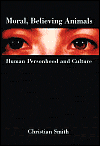
Christian Smith
Reviewed by: James W. Scott
Moral, Believing Animals: Human Personhood and Culture, by Christian Smith. Published by Oxford University Press, 2003. Hardback, 172 pages, list price $22.00. Reviewed by managing editor James W. Scott.
Christian Smith is a professor of sociology at the University of North Carolina, Chapel Hill. He is a Christian, not just by name, but also by profession (being, incidentally, a son-in-law of OP pastor Thomas E. Tyson). He has been making his way, mostly with sociological studies of religion, in an academic discipline that is often hostile to Christianity.
Dissatisfied with the leading "theoretical systems purporting to explain human action and social life," rooted as they are in "the naturalistic, utilitarian, antimentalist, noncultural tradition of Western social theory," Smith sets forth his view that the most adequate social theory "conceives of humans as moral, believing, narrating animals and human social life as constituted by moral orders that define and direct social action" (pp. 147-48). (By"narrating," Smith means that people find purpose in their lives by placing themselves in a "narrative" that organizes human actions and events in a meaningful whole; Christianity, liberalism, and postmodernism are examples of narratives.)
As this thesis indicates, this book is written in sociological jargon that the uninitiated will have some difficulty getting used to. Once the reader learns the lingo, however, the argument of this book becomes quite clear and straightforward. What Smith is really saying, in nontheological language, is that the traditional Christian view of man, society, and history is correct, and that the jettisoning of it by leading theorists in the social sciences and humanities has left those disciplines with fundamental shortcomings.
Smith's thesis, as addressed to his academic peers, is provocative, but it is expressed in a calm, serious way. Probably the most provocative part of his argument is that people are religious because they feel a "built-in" need to relate to the God who really does exist; this view, he admits, is "controversial, daring, and radical" (p. 109; see p. 117). Yet this is just rudimentary Christian theology that has been around for centuries. Indeed, Smith himself says that "nothing developed in this book is new or original" (p. 4). But a Pharaoh now rules in academia who knows not Joseph and is hardened against the truth.
It is imperative that Christian scholars engage the academic world of unbelief, not just avoid it. For making this effort, then, Smith is to be commended. Works like this are needed in all fields, seeking to influence academic disciplines in their own terms. It is also important for Christians working in these disciplines to know that positions can be articulated that are consistent with Christian faith.
This book is recommended for all students of sociology and related fields.
March 30, 2025
On the Trail with a Missionary
March 23, 2025
Midnight Mercies: Walking with God Through Depression in Motherhood
March 16, 2025
March 09, 2025
Zwingli the Pastor: A Life in Conflict
March 02, 2025
February 23, 2025
African Heroes: Discovering Our Christian Heritage
February 16, 2025
© 2025 The Orthodox Presbyterian Church